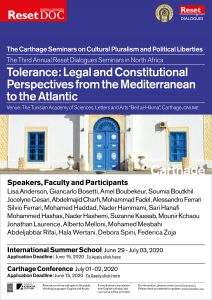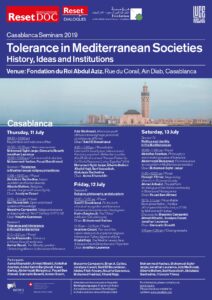An International Symposium and School on Religious Pluralism, Education and Political Liberties
The international association Reset Dialogues on Civilizations has launched in 2018 the Reset Seminars on Pluralism in North Africa, a yearly international program on cultural and religious pluralism and political liberties. The purpose is to promote a local intellectual response to the rise of rigorist strands of Islamic thought by training 40 emerging opinion-leaders on the relationship between religion, history and power and to contribute to the reawakening of pluralistic traditions in Muslim contexts.
This is addressed through the critical tools provided by a wide range of social sciences, from political philosophy to sociology, from domestic law to theology, from a variety of socio-cultural perspectives. These include the diverse historical processes characterizing the contemporary world, institutional organization in Europe, North America and Muslim countries, juridical and constitutional law and the related political theories, the differences and shared traits that pluralist positions arise from, the variety of positions in the Islamic cadre as well as the historicity of Jewish, Christian, Muslim and other religious denominations.
The academic teachings are complemented by project management tools to facilitate the training’s embedment into the participants’ daily work and are transferred in tutoring sessions where participants learn to plan and apply the new concepts and tools.
The project impact comes from its unique combination of techniques that allow for the propagation of its teachings to students and the broader public in the region.
Recent speakers, faculty and participants: Asma Afsaruddin, Massimo Campanini, Jocelyne Cesari, Khalid Hajji, Aziz Mechouat, Abdulaziz Sachedina.
This project is made possible through the generosity of the Henry Luce Foundation
History
Casablanca Seminars 2019: Tolerance in Mediterranean Societies: History, Ideas, and Institutions
Casablanca Seminars 2018: Sources of Pluralism in Islamic Thought




